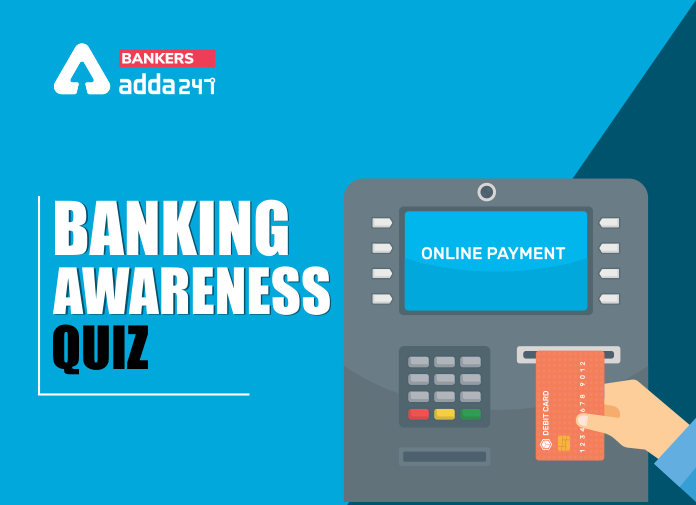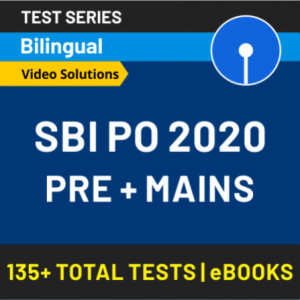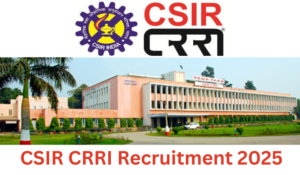Table of Contents
The Banking Awareness section constitutes a major part of a competitive examination and needs your undivided attention. With the increased competition in the field of Banking examinations, it has now become very important to cover up all the sections efficiently.
Banking Affairs 20th August 2020 Quiz
To complement your preparation for General Awareness section of the upcoming exams like SBI Clerk Mains and RBI Assistant Mains we are providing you Banking Awareness Quiz of 20th August 2020 covering the following topics: Credit risk, ADF, Public Provident Fund, NSSO, SEPA, Current Account.
Q1. Which of the following types of cards is free from credit risk?
(a) Credit card
(b) Debit Card
(c) Charge Cards
(d) All of the above
(e) Both (c) and (d)
Q2. A type of economy that still uses various means of social support, is called_____________.
(a) Capitalist Economy
(b) Mixed Economy
(c) Socialist Economy
(d) Traditional Economy
(e) None of the given options is true
Q3. In the field of banking, what does ADF stand for?
(a) Additional Dearness Allowance
(b) Automated Data Flow
(c) Additional Deposit Allowance
(d) Automated Deposit Allowance
(e) None of the given options is true
Q4. What is the duration of Public Provident Fund (PPF) account?
(a) 3 years
(b) 5 years
(c) 9 years
(d) 15 years
(e) 18 years
Q5. Under which Act are the KYC norms implemented______________.
(a) SEBI Act, 1992
(b) Foreign Contribution and Regulation Act, 1976
(c) Prevention of Money laundering Act, 2002
(d) Banking Regulation Act, 1949
(e) None of the given options is true
Q6. SEPA Stands for ____________.
(a) Scottish Environment Protection Agency
(b) Single Euro Payments Area
(c) Scottish Environment Protection Area
(d) Single Euro Payments Agency
(e) None of the given options is true
Q7. The Definition of ‘Banking’ is given in___________.
(a) Negotiable Instrument Act, 1881
(b) RBI Act, 1934
(c) The Banking Regulation Act, 1949
(d) Indian Contract Act, 1872
(e) None of the given options is true
Q8. Which of the following is governed by the provisions of Section 42 (1) of the Reserve Bank of India Act, 1934?
(a) Bank rate
(b) Reverse Repo Rate
(c) SLR
(d) CRR
(e) MSF
Q9. Spurious coins detected at the counter are sent to________________.
(a) RBI
(b) GOI
(c) IBRD
(d) Mint
(e) Finance Ministry
Q10. National Sample Survey Organisation (NSSO) is an organization under the________________.
(a) Ministry of Finance
(b) Ministry of Rural Development
(c) Ministry of Commerce and Industry
(d) Ministry of Electronics and Information Technology
(e) Ministry of Statistics and Programme Implementation
Q11. Sukanya Samriddhi Account can be opened up to age of ________ years only from the date of birth.
(a) Five years
(b) Four years
(c) Six years
(d) Eight years
(e) Ten years
Q12. The minimum paid-up equity capital for small finance banks shall be____________.
(a) Rs. 100 crore
(b) Rs. 200 crore
(c) Rs. 300 crore
(d) Rs. 400 crore
(e) Rs. 500 crore
Q13. Reserve Bank of India has granted in-principle licence for small finance banks. The in-principle approval granted by RBI will be valid for a period of ________ months.
(a) 24 months
(b) 10 months
(c) 18 months
(d) 50 months
(e) 12 months
Q14. Which of the following economic concepts is categorised on the basis of Current Account or Capital Account or both?
(a) Balance of Payments
(b) Value of the food grain stock of a country
(c) Gross National Product
(d) Gross National Income(GNI)
(e) Total collection of Direct Taxes in a year
Q15. RBI was granted a licence to small Finance Banks for commencement of banking business under Section ______ of the Banking Regulation Act, 1949.
(a) Section 38(3)
(b) Section 22(1)
(c) Section 47(4)
(d) Section 12(2)
(e) Section 27(5)
Solutions
S1. Ans.(b)
Sol. A debit card a safe, convenient, risk-free alternative to cash and has no credit risks attached.
S2. Ans.(d)
Sol. Definition of traditional economy: A type of economy that still uses various means of social support. Some feel that this may be out of date and thus refer to it as a traditional economy.
S3. Ans.(b)
Sol. The Automated Data Flow (ADF) is a unique initiation by RBI aimed at the purpose of meeting the needs for accurate and consistent flow of data. Automated Data Flow ensures that the data submitted from the banks to Reserve Bank of India is correct and consistent without any kind of manual intervention.
S4. Ans.(d)
Sol. A PPF account matures in 15 years, but you can extend the tenure in blocks of five years after maturity. The balance continues to earn interest at the normal rate. The minimum investment of Rs 500 has to be maintained even for accounts extended beyond 15 years.
S5. Ans.(c)
Sol. KYC guidelines/instructions are issued under under Prevention of Money laundering Act PMLA, 2002.
S6. Ans.(b)
Sol. The Single Euro Payments Area (SEPA) is a payment-integration initiative of the European Union for simplification of bank transfers denominated in euro.
S7. Ans.(c)
Sol. As per Section 5(b) of the Banking Regulation Act, 1949 , “banking” means the accepting, for the purpose of lending or investment, of deposits of money from the public, repayable on demand or otherwise, and withdraw-able by cheque, draft, order or otherwise.
S8. Ans.(d)
Sol. CRR is governed by the provisions of Section 42 (1) of the Reserve Bank of India Act, 1934.
S9. Ans.(d)
Sol. when Spurious coins tendered over the counter, it should be cut and handed over to the tenderer. If the tenderer disputes it, the coins should be sent to the mint at his cost, for examination.
S10. Ans.(e)
Sol. The National Sample Survey Organisation (NSSO), now known as National Sample Survey Office, is an organization under the Ministry of Statistics and Programme Implementation of the Government of India. It is the largest organisation in India conducting regular socio-economic surveys.
S11. Ans.(e)
Sol. Sukanya Samriddhi Account can be opened up to age of 10 years only from the date of birth.
S12. Ans.(a)
Sol. The minimum paid-up equity capital for small finance banks shall be Rs. 100 crore.
S13. Ans.(c)
Sol. Reserve Bank of India has granted in-principle licence for small finance banks to ten entities. The in-principle approval granted by RBI will be valid for a period of 18 months.
S14. Ans.(a)
Sol. A Balance of payments statements is a summary of a nation’s total economic transactions undertaken on international account. It is usually composed of two sections:-
1. Current Account
2. Capital Account
S15. Ans.(b)
Sol. RBI was granted a licence to small Finance Banks for commencement of banking business under Section 22(1) of the Banking Regulation Act, 1949.
Download PDF for this Quiz
Click Here to Register for Bank Exams 2020 Preparation Material
You may also like to read:
- Current Affairs & Daily GK Updates 2020
- Latest GK and Current Affairs Questions With Answers For All Bank Exam
- SBI Clerk Result 2020
- Bihar Board 12th Result 2020
- NEET Admit Card 2020
20th August Current Affairs 2020 | Current Affairs Today | Daily Current Affairs 2020
Visit Achieversadda.com and participate in discussions with other aspirants and achievers. Get answers to your queries and connect with others on Achieversadda.com
All the Best BA’ians for RBI Assistant Mains!





 GA Capsule for SBI Clerk Mains 2025, Dow...
GA Capsule for SBI Clerk Mains 2025, Dow...
 The Hindu Review October 2022: Download ...
The Hindu Review October 2022: Download ...
 Delhi CSIR CRRI Recruitment 2025 Notific...
Delhi CSIR CRRI Recruitment 2025 Notific...







